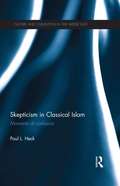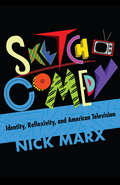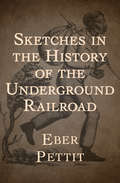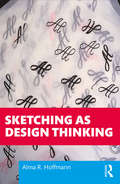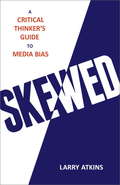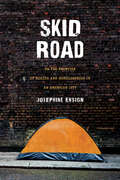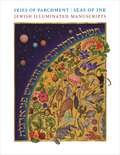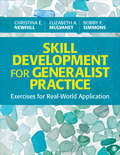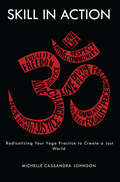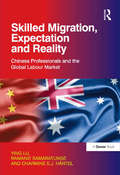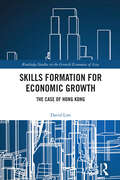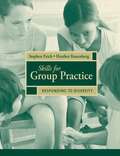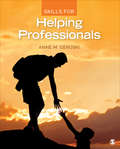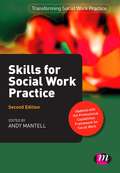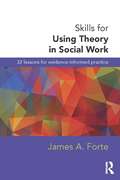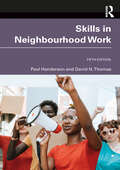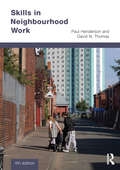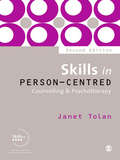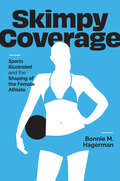- Table View
- List View
Skepticism in Classical Islam: Moments of Confusion (Culture and Civilization in the Middle East)
by Paul L. HeckThe first major treatment of skepticism in Islam, this book explores the critical role of skeptical thinking in the development of theology in Islam. It examines the way key thinkers in classical Islam faced perplexing questions about the nature of God and his relation to the world, all the while walking a fine line between belief in God’s message as revealed in the Qur’an, and the power of the mind to discover truths on its own. Skepticism in Classical Islam reveals how doubt was actually an integral part of scholarly life at this time. Skepticism is by no means synonymous with atheism. It is, rather, the admission that one cannot convincingly demonstrate a truth claim with certainty, and Islam’s scholars, like their counterparts elsewhere, acknowledged such impasses, only to be inspired to find new ways to resolve the conundrums they faced. Whilst their conundrums were unique, their admission of the limits of knowledge shares much with other scholarly traditions. Seeking to put Islam on the map of the broader study of the history of scepticism, this book will be of interest to scholars and students of Religion, History and Philosophy.
Sketch Comedy: Identity, Reflexivity, and American Television
by Nick MarxA history of sketch comedy on American television and analysis of what it says about American culture and society.In Sketch Comedy: Identity, Reflexivity, and American Television, Nick Marx examines some of the genre’s most memorable?and controversial?moments from the early days of television to the contemporary line-up. Through explorations of sketches from well-known shows such as Saturday Night Live, The State, Inside Amy Schumer, Key & Peele, and more, Marx argues that the genre has served as a battleground for the struggle between comedians who are pushing the limits of what is possible on television and network executives who are more mindful of the financial bottom line. Whether creating new catchphrases or transgressing cultural taboos, sketch comedies give voice to marginalized performers and audiences, providing comedians and viewers opportunities to test their own ideas about their place in society, while simultaneously echoing mainstream cultural trends. The result, Marx suggests, is a hilarious and flexible form of identity play unlike anything else in American popular culture and media.“An excellent study of a long-neglected area in television/media studies and is part of a larger turn toward the centrality of comedy in post-war U.S. culture.” —Jeffrey Sconce, Northwestern University“A stalwart of television . . . sketch comedy finally gets the in-depth critical attention it deserves . . . Marx shows how sketch comedy has fit (and been constrained by) TV’s industrial contexts, from live variety shows in its earliest days to movement across media in the era of multiple platforms. These case studies not only chart sketch comedy’s past, they provide the theoretical and analytical tools to consider its future.” —Ethan Thompson, Texas A&M University Corpus Christi
Sketch Comedy: Identity, Reflexivity, and American Television
by Nick MarxA history of sketch comedy on American television and analysis of what it says about American culture and society.In Sketch Comedy: Identity, Reflexivity, and American Television, Nick Marx examines some of the genre’s most memorable?and controversial?moments from the early days of television to the contemporary line-up. Through explorations of sketches from well-known shows such as Saturday Night Live, The State, Inside Amy Schumer, Key & Peele, and more, Marx argues that the genre has served as a battleground for the struggle between comedians who are pushing the limits of what is possible on television and network executives who are more mindful of the financial bottom line. Whether creating new catchphrases or transgressing cultural taboos, sketch comedies give voice to marginalized performers and audiences, providing comedians and viewers opportunities to test their own ideas about their place in society, while simultaneously echoing mainstream cultural trends. The result, Marx suggests, is a hilarious and flexible form of identity play unlike anything else in American popular culture and media.“An excellent study of a long-neglected area in television/media studies and is part of a larger turn toward the centrality of comedy in post-war U.S. culture.” —Jeffrey Sconce, Northwestern University“A stalwart of television . . . sketch comedy finally gets the in-depth critical attention it deserves . . . Marx shows how sketch comedy has fit (and been constrained by) TV’s industrial contexts, from live variety shows in its earliest days to movement across media in the era of multiple platforms. These case studies not only chart sketch comedy’s past, they provide the theoretical and analytical tools to consider its future.” —Ethan Thompson, Texas A&M University Corpus Christi
Sketches in the History of the Underground Railroad: Comprising Many Thrilling Incidents Of The Escape Of Fugitives From Slavery, And The Perils Of Those Who Aided Them (classic Reprint) (Black Heritage Library Collection)
by Eber PettitTrue stories drawn from the inspirational and heartrending history of the Underground Railroad It is estimated that by 1850 over one hundred thousand slaves had escaped to freedom in the North via a network of safe houses and secret routes known collectively as the Underground Railroad. First published in 1879, Sketches in the History of the Underground Railroad chronicles the perilous journeys and thrilling adventures of nearly two-dozen escaped slaves and the brave souls who helped them along the way. Compiled by a conductor on the Railroad, these sketches bring the horrors of slavery to vivid life and serve as an enduring testament to the power of the human spirit. This ebook has been professionally proofread to ensure accuracy and readability on all devices.
Sketching as Design Thinking
by Alma R. HoffmannThis book argues for the importance of sketching as a mode of thinking, and the relevance of sketching in the design process, design education, and design practice. Through a wide range of analysis and discussion, the book looks at the history of sketching as a resource throughout the design process and asks questions such as: where does sketching come from? When did sketching become something different to drawing and how did that happen? What does sketching look like in the present day? Alongside an in-depth case study of students, teachers, and practitioners, this book includes a fascinating range of interviews with designers from a wide variety of backgrounds, including fashion, user experience, and architecture. Sketching as Design Thinking explains how drawing and sketching remain a prominent aspect in our learning and creative process, and provides a rich resource for students of visual art and design.
Sketchy Santas
by Will ZweigartHo, ho, huh?Who's that excessively jolly fellow with the fake beard, shifty eyes, sweaty hands, and boozy breath? Why, it's not just Santa but sketchy Santa! Yes, 'tis the season for awkward photos of small children posed precariously on the laps of some of the most clownish, irritable, and just plain weird-looking Santa wannabes--guys you'd give a wide berth to if you passed them on the street.Inside this painfully hilarious collection of holiday photos, you'll discover the pop culture history of the sketchy Santa, and how to identify sketchy Santas in shopping malls everywhere . . . making this the perfect gift for anyone who understands that "He sees you when you're sleeping" is a deeply disturbing thought.
Skewed: A Critical Thinker's Guide to Media Bias
by Larry AtkinsIn a media landscape dominated by advocacy news networks pushing competing points of view, how can the average person uncover the truth about any particular issue? This book will show you how to separate the facts from the agenda-driven spin and selective presentation often used by such news sources as Fox and MSNBC.The author describes the goals of advocacy journalism--i.e., journalism that transparently advocates a biased worldview--and shows that it has been a part of our history since the 1700s. He assesses the role of talk radio, cable news networks, and the more recent phenomena of special-interest blogs, websites, and citizen journalists in creating the current media climate. While conceding that advocacy journalism is undoubtedly popular and has some positive aspects, the author also points out its many negative features. Perhaps the most important of these is its polarizing effect on society.Skewed will give readers the tools to critique the media, to see both sides of any issue, and to become better informed citizens and voters.From the Hardcover edition.
Skid Road: On the Frontier of Health and Homelessness in an American City
by Josephine EnsignA compelling look at the historical roots of poverty and homelessness, the "worthy" and "unworthy" poor, and the role of charity health care and public policy in the United States.Home to over 730,000 people, with close to four million people living in the metropolitan area, Seattle has the third-highest homeless population in the United States. In 2018, an estimated 8,600 homeless people lived in the city, a figure that does not include the significant number of "hidden" homeless people doubled up with friends or living in and out of cheap hotels. In Skid Road, Josephine Ensign digs through layers of Seattle history—past its leaders and prominent citizens, respectable or not—to reveal the stories of overlooked and long-silenced people who live on the margins of society. The sometimes fragmentary tales of these people, their lives and deaths, are not included in official histories of a place. How, Ensign asks, has a large, socially progressive city like Seattle responded to the health needs of people marginalized by poverty, mental illness, addiction, racial/ethnic/sexual identities, and homelessness? Drawing on interviews and extensive research, Ensign shares a diversity of voices within contemporary health care and public policy debates. Informed by her own lived experience of homelessness, as well as over three decades of work as a family nurse practitioner providing primary health care to homeless people, Ensign is uniquely situated to explore the tensions between caregiving and oppression, as well as charity and solidarity, that polarize perspectives on homelessness throughout the country. A timely story in light of the ongoing health care reform debate, the affordable housing crisis, and the COVID-19 pandemic, the stories from Skid Road illuminate issues surrounding poverty and homelessness throughout America.
Skies of Parchment, Seas of Ink: Jewish Illuminated Manuscripts
by Raymond P. Scheindlin Eva Frojmovic Diane Wolfthal Jenna Siman Jacobs Hartley Lachter Shalom Sabar Ágnes Vető Susan Vick Barbara WolffA superbly illustrated history of five centuries of Jewish manuscriptsThe love of books in the Jewish tradition extends back over many centuries, and the ways of interpreting those books are as myriad as the traditions themselves. Skies of Parchment, Seas of Ink offers the first full survey of Jewish illuminated manuscripts, ranging from their origins in the Middle Ages to the present day. Featuring some of the most beautiful examples of Jewish art of all time—including hand-illustrated versions of the Bible, the Haggadah, the prayer book, marriage documents, and other beloved Jewish texts—the book introduces readers to the history of these manuscripts and their interpretation.Edited by Marc Michael Epstein with contributions from leading experts, this sumptuous volume features a lively and informative text, showing how Jewish aesthetic tastes and iconography overlapped with and diverged from those of Christianity, Islam, and other traditions. Featured manuscripts were commissioned by Jews and produced by Jews and non-Jews over many centuries, and represent Eastern and Western perspectives and the views of both pietistic and liberal communities across the Diaspora, including Europe, Israel, the Middle East, and Africa.Magnificently illustrated with pages from hundreds of manuscripts, many previously unpublished or rarely seen, Skies of Parchment, Seas of Ink offers surprising new perspectives on Jewish life, presenting the books of the People of the Book as never before.
Skill Development for Generalist Practice: Exercises for Real-World Application
by Christina E. Newhill Elizabeth A. Mulvaney Bobby F. SimmonsSkill Development for Generalist Practice offers an array of competency-building exercises addressing foundational social work knowledge as well as skills and values across micro, mezzo, and macro levels of practice. Designed to be actively used during class time, exercises embrace the diverse range of clients encountered by social workers in various practice settings and reflect a commitment to serving those who are the most vulnerable, at risk, disadvantaged, and marginalized from society.
Skill Development for Generalist Practice: Exercises for Real-World Application
by Christina E. Newhill Elizabeth A. Mulvaney Bobby F. SimmonsSkill Development for Generalist Practice offers an array of competency-building exercises addressing foundational social work knowledge as well as skills and values across micro, mezzo, and macro levels of practice. Designed to be actively used during class time, exercises embrace the diverse range of clients encountered by social workers in various practice settings and reflect a commitment to serving those who are the most vulnerable, at risk, disadvantaged, and marginalized from society.
Skill in Action: Radicalizing Your Yoga Practice to Create a Just World
by Michelle Cassandra JohnsonTransform your yoga practice into a force for creating social change with this concise, eloquent guide to social justice tools and skills.Skill in Action asks you to explore the deeply transformational practice of yoga as a way to become an agent of social change and work toward a just world. Through yoga practices and philosophy, this book explores liberation for ourselves and others, while asking us to engage in our own agency--whether that manifests as activism, volunteer work, or changing our relationships with others and ourselves. To provide a strong foundation to begin this work, Michelle Cassandra Johnson clearly defines power and privilege, oppression, liberation, and suffering, and invites you to make changes in your life that promote equality and freedom for all. Each chapter ends with a breathwork, asana, meditation, or interpersonal relational practice to help you incorporate this wisdom into your daily life. Each of the practices extend beyond the individual to offer resources and tools to shift institutional policies and procedures in a culture that has left all of us negatively impacted by white supremacy and social inequity. We must awaken to the injustice and suffering of marginalized communities, and we must use our voices and actions toward the liberation of all people.
Skilled Migration, Expectation and Reality: Chinese Professionals and the Global Labour Market
by Ramanie Samaratunge Ying LuMany governments seek to attract skilled migrants into the top occupational groups and now have significant groups of overseas-born professionals in their workforces. Such groups are expected to contribute significantly to the economic and social development of their new countries. There has been sustained debate between those taking the view that skilled migrants are integrated without much difficulty and those concerned that a mismatch between aspirational government policies and actual organisational practice generates discontent and frustration among skilled immigrants. If the latter is correct, it seems likely that host societies will not benefit from the injection of human capital in terms of creativity and innovation. In Skilled Migration, Expectation and Reality the authors report the findings of their research into the acculturation and integration issues confronting professional Chinese immigrants in the Australian labour market. Australia serves as a good example of the phenomenon under examination, being a country where Chinese are one of the largest non-English speaking ethnic groups and where they are strongly concentrated in the top occupational groups. The authors’ rigorous quantitative and qualitative study is one of the first systematic examinations of acculturation to focus specifically on the workplace. It reveals fascinating insights regarding the strategies that professional immigrants are compelled to adopt because they are unable to find appropriate channels through which to integrate and assimilate into the host society.
Skills Formation for Economic Growth: The Case of Hong Kong (Routledge Studies in the Growth Economies of Asia)
by David LimThis book explores the vocational education programmes of Hong Kong, programmes that are repeatedly noted for their excellence.The book traces the founding and development of the Vocational Training Council of Hong Kong, which was set up in 1982 to offer sub-degree programmes in vocational and professional education and training. It shows how it transformed itself from an institution seen by industry, government and the public alike as not meeting the needs of Hong Kong to one that has spearheaded the development of this form of education in Hong Kong, including offering degree programmes in these areas through its Technological and Higher Education Institute.Written by a leading scholar of vocational education with extensive experience of devising and implementing vocational education programmes, it offers this as a valuable resource to students and scholars of education, particularly in an Asian context, as well as of vocational and professional education and training.
Skills for Group Practice Responding to Diversity
by Stephen Erick Heather KanenbergThis text is a skills book of role play exercises for treatment and task groups that emphasizes diversity (including sex, sexual orientation, gender identity/expression, race, ethnic background, language, national origin, religion, marital status, class, health status, mental or physical ability, age, socio-economic status, and political belief) and the experience of group facilitation. The exercises in this skills book provide BSW & MSW students with wonderful opportunities to engage in "real life" group experiences, or at least a close approximation of working with real clients.
Skills for Helping Professionals
by Anne M. GeroskiWritten specifically for non-clinical undergraduate students, but also relevant to graduate studies in helping professions, Skills for Helping Professionals, by Anne M. Geroski focuses on helping students develop the skills they need to effectively initiate and maintain helping relationships. After exploring the literature identifying critical components of helping relationships and briefly reviewing developmental and helping theories, the text covers such topics as the helping process, self-awareness, and ethics in helping, and then focuses on specific helping skills such as listening and hearing, empathy, reflecting, paraphrasing, questioning, clarifying, exploring, and offering feedback, encouragement, and psycho-education. The final chapters focus on individuals in crisis and helping in groups.
Skills for Helping Professionals
by Anne M. GeroskiWritten specifically for non-clinical undergraduate students, but also relevant to graduate studies in helping professions, Skills for Helping Professionals, by Anne M. Geroski focuses on helping students develop the skills they need to effectively initiate and maintain helping relationships. After exploring the literature identifying critical components of helping relationships and briefly reviewing developmental and helping theories, the text covers such topics as the helping process, self-awareness, and ethics in helping, and then focuses on specific helping skills such as listening and hearing, empathy, reflecting, paraphrasing, questioning, clarifying, exploring, and offering feedback, encouragement, and psycho-education. The final chapters focus on individuals in crisis and helping in groups.
Skills for Helping Professionals
by Anne M. GeroskiWritten specifically for non-clinical undergraduate students, but also relevant to graduate studies in helping professions, Skills for Helping Professionals, by Anne M. Geroski focuses on helping students develop the skills they need to effectively initiate and maintain helping relationships. After exploring the literature identifying critical components of helping relationships and briefly reviewing developmental and helping theories, the text covers such topics as the helping process, self-awareness, and ethics in helping, and then focuses on specific helping skills such as listening and hearing, empathy, reflecting, paraphrasing, questioning, clarifying, exploring, and offering feedback, encouragement, and psycho-education. The final chapters focus on individuals in crisis and helping in groups.
Skills for Helping Professionals
by Anne M. GeroskiWritten specifically for non-clinical undergraduate students, but also relevant to graduate studies in helping professions, Skills for Helping Professionals, by Anne M. Geroski focuses on helping students develop the skills they need to effectively initiate and maintain helping relationships. After exploring the literature identifying critical components of helping relationships and briefly reviewing developmental and helping theories, the text covers such topics as the helping process, self-awareness, and ethics in helping, and then focuses on specific helping skills such as listening and hearing, empathy, reflecting, paraphrasing, questioning, clarifying, exploring, and offering feedback, encouragement, and psycho-education. The final chapters focus on individuals in crisis and helping in groups.
Skills for Social Work Practice (Transforming Social Work Practice Series)
by Andy MantellSocial work skills are essential to good practice and more important than ever following changes to the social work curriculum. Students must be able to demonstrate knowledge of core skills within policy, law as well as demonstrating empathy and good communication. This fully-revised student guide, previously published as Social Work Skills with Adults, will help to cement these skills and includes chapters on intervention, empowerment and advocacy, skills for collaborative working, self-presentation and much more. This book will equip social work students with the skills to meet the new and perennial challenges to achieving empowering practice with carers and people who use services. There are chapters on working with families, communities and individuals and how social policy affects all of these groups. Case studies and reflective exercises are used throughout to explore these issues and help link theory to practice.
Skills for Using Theory in Social Work: 32 Lessons for Evidence-Informed Practice
by James A. ForteUsing theory, research evidence and experiential knowledge is a critical component of good social work. This unique text is designed to help social work students and practitioners to integrate theorizing into practice, demonstrating how to search for, select and translate academic knowledge for practical use in helping people improve their lives and environments. Presenting 32 core skills, Skills for Using Theory in Social Work provides a conceptual foundation, a vocabulary, and a set of skills to aid competent social work theorizing. Each chapter outlines the knowledge and action components of the skill and its relationship to core practice behaviours, along with learning and reflection activities. The lessons are divided into four parts: Section one discusses foundational material, including self-identification as a theorist-practitioner, the deliberate use of the term theory, and a social work approach to the selection of knowledge. Section two focuses on the adept use of theorizing skills. It covers identifying assumptions, using concepts, formulating propositions, organizing theory elements inductively or deductively, summarizing and displaying the elements of a theory, gathering and organizing assessment information and communicating with clients and colleagues about tentative theories. Section three includes lessons preparing social workers for the construction of useful middle-range theories including causal theories and interpretive theories and for testing and sharing these practical theories. Section four presents skills to develop critical thinking about theoretical knowledge. These include avoiding the misuse of theory, judging a theory using scientific standards, judging a theory by professional standards, critiquing theory in its cultural and historical context and making judgments about the likely long-term impact of a theory. This key text will help readers to demonstrate their expertise in reflective, competent, and theory-informed practice. It is suitable for all social work students and practitioners, particularly those taking practice, theory and human behaviour in the social environment courses.
Skills in Neighbourhood Work
by Paul Henderson David N. ThomasSkills in Neighbourhood Work is a practice textbook. It explains the skills, knowledge and techniques needed by community workers and other practitioners to work effectively in and with communities. While the principles and methods it describes have stood the test of time, the political, economic and social changes which have taken place since the book was first published have made new editions essential. Rewritten and updated to include new practice examples, this fifth edition retains all the practical information needed by the student or practitioner but sets it in the contemporary context. Including a European perspective and views from North America and Australia, it covers: Starting, supporting and ending work with community groups Evaluation Data collection Goals and priorities Making contacts Group work Helping groups work with other organisations. This invaluable textbook is essential reading for students and practitioners of community work.
Skills in Neighbourhood Work (National Institute Social Services Library #No. 39)
by Paul Henderson David N. ThomasSkills in Neighbourhood Work is a practice textbook. It explains the skills, knowledge and techniques needed by community workers and other practitioners to work effectively in and with communities. While the principles and methods it describes have stood the test of time, the political, economic and social changes which have taken place since the book was first published have made new editions essential. Rewritten and updated, and including new practice examples, the fourth edition retains all the practical information needed by the student or practitioner but sets it in the contemporary context. Including a European perspective and views from America and Australia, it covers: starting, supporting and ending work with community groups evaluation data collection goals and priorities making contacts group work helping groups work with other organisations. This invaluable textbook is essential reading for students and practitioners of community work.
Skills in Person-Centred Counselling & Psychotherapy
by Janet TolanTolan (counseling, City College, Manchester) brings to life the experience and practice of person-centered psychotherapy. Chapters offer example interactions and exercises in empathetic understanding, psychological contact (basic, cognitive, and subtle), therapeutic process, beginning and ending, and the theoretical framework for person-centered therapy. She also discusses managing work in an organization. Each chapter ends with a list of further reading. This second edition includes a new chapter on debates and developments in practice, authored by Rose Cameron, and a jointly written chapter on edgy and ethical issues. Annotation ©2012 Book News, Inc. , Portland, OR (booknews. com)
Skimpy Coverage: Sports Illustrated and the Shaping of the Female Athlete (Cultural Frames, Framing Culture)
by Bonnie M. HagermanSkimpy Coverage explores Sports Illustrated’s treatment of female athletes since the iconic magazine’s founding in 1954. The first book-length study of its kind, this accessible account charts the ways in which Sports Illustrated—arguably the leading sports publication in postwar America—engaged with the social and cultural changes affecting women’s athletics and the conversations about gender and identity they spawned.Bonnie Hagerman examines the emergence of the magazine’s archetypal female athlete—good-looking, straight, and white—and argues that such qualities were the same ones the magazine prized in the women who appeared in its wildly successful Swimsuit Issue. As Hagerman shows, the female athlete and the swimsuit model, at least for the magazine, were essentially one and the same. Despite this conflation, and the challenges it poses, Hagerman also tracks the distance that sportswomen—including Wilma Rudolph, Billie Jean King, Serena Williams, and Megan Rapinoe—have traveled both within Sports Illustrated’s pages and without. Blending sports with gender history, Skimpy Coverage profiles numerous sportswomen who have used athletics and the platform sport offers to push for empowerment, freedom, equality, and acceptance in ways that have complemented and inspired broader feminist agendas.
